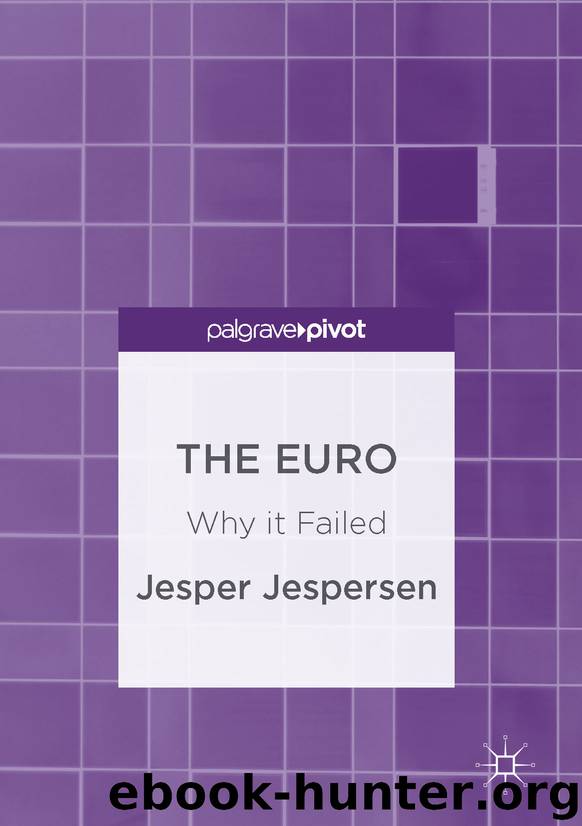The Euro by Jesper Jespersen

Author:Jesper Jespersen
Language: eng
Format: epub
Publisher: Springer International Publishing, Cham
Fallacy of Composition (II): ‘The Sun Is Moving Around the Earth’
Allow me to present another empirical parable to explain why, when arguments are applied to macroeconomic issues, the ‘obvious’ is not necessarily the ‘real’. Anyone looking up the sky can see the sun is moving during the day from east to west, while this movement repeats itself next morning. In the Middle Ages, only a few scientists challenged the orthodoxy that the earth was at the centre of the universe with the sun revolving around it. That is to say, they dared to challenge the obvious and were therefore considered heretics which, to say the least, made life difficult for them. It took several hundred years and many, many careful empirical measurements before doubts arose.
The similarities to macroeconomics are striking. Macroeconomic phenomena cannot be observed directly. Only theoretical models of the economy as a whole, combined with skilful and careful use of econometric methods used on data from national accountancy, can reveal the most likely explanation of the macroeconomic dynamic forces. Indeed, the similarities to astronomy are striking. It was not until very precise predictions were made possible by the Newtonian planet model that the public and the Church were at last convinced that the sun were in the centre. Yet, macroeconomics is lagging far behind astronomy with regard to precise forecasts. In fact, macroeconomics will never be like (natural) sciences because social phenomena are ‘man made’ without any eternal laws of movement.
On the other hand, many macroeconomists have the aspiration to set up a model capable of giving reliable answers to what different policies and institutional reforms may bring in the future. A macroeconomic model is a system with many intertwined relationships at the national level and at the international level, where a common currency forces a far-reaching institutional change, which makes the consequences of fiscal rules deviate from past experiences.
For those governments that do not have an independent currency and central bank, the public sector budget – that is, fiscal policy – is almost the only tool which is left to stabilise the economy as a whole. Hence, it is even more crucial to understand the role of public debt and deficits correctly.
Let me now summarise the two sections on the ‘fallacy of composition’. They have provided simple examples of why macroeconomic results cannot, in general, be derived from microeconomic arguments assuming individual optimisation and fully flexible and self-adjusting markets. These conclusions are important because they provide theoretical arguments as to why monetarism cannot, in most cases, provide a realistic understanding of macroeconomic dynamics in terms of the economic consequences of the public sector.
Download
This site does not store any files on its server. We only index and link to content provided by other sites. Please contact the content providers to delete copyright contents if any and email us, we'll remove relevant links or contents immediately.
| Anthropology | Archaeology |
| Philosophy | Politics & Government |
| Social Sciences | Sociology |
| Women's Studies |
The Secret History by Donna Tartt(19090)
The Social Justice Warrior Handbook by Lisa De Pasquale(12190)
Thirteen Reasons Why by Jay Asher(8912)
This Is How You Lose Her by Junot Diaz(6887)
Weapons of Math Destruction by Cathy O'Neil(6281)
Zero to One by Peter Thiel(5802)
Beartown by Fredrik Backman(5755)
The Myth of the Strong Leader by Archie Brown(5508)
The Fire Next Time by James Baldwin(5447)
How Democracies Die by Steven Levitsky & Daniel Ziblatt(5219)
Promise Me, Dad by Joe Biden(5154)
Stone's Rules by Roger Stone(5088)
A Higher Loyalty: Truth, Lies, and Leadership by James Comey(4964)
100 Deadly Skills by Clint Emerson(4926)
Rise and Kill First by Ronen Bergman(4789)
Secrecy World by Jake Bernstein(4753)
The David Icke Guide to the Global Conspiracy (and how to end it) by David Icke(4720)
The Farm by Tom Rob Smith(4514)
The Doomsday Machine by Daniel Ellsberg(4490)
